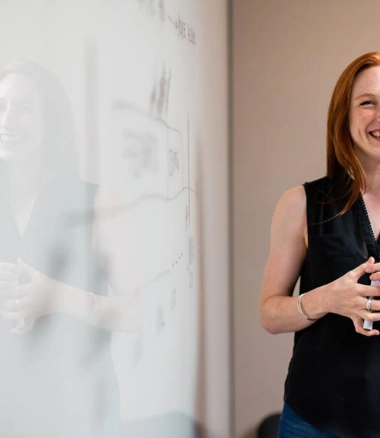
It doesn’t hit you like burnout does.
There’s no single breaking point. No dramatic stress spiral. No visible signs of collapse.
Just a slow fade. A creeping sense of detachment. The feeling that your work, once demanding, absorbing, and worth the hours, has somehow gone flat. You tell yourself you’re just tired. That you need a break. That you’re burnt out.
But what if you’re not?
What if what you’re feeling isn’t exhaustion, but boredom? And what if that’s even more dangerous?
The Invisible Crisis in Mid-Career
Across Australia’s engineering, architecture and project delivery sectors, thousands of experienced professionals are quietly disengaging.
Not because the pressure is too much. But because the challenge is too small.
You do your job well. You hit the deadlines. You lead the meetings. You make things happen. But you’re not learning anymore. Not pushing anything forward. Not proud of the work in the same way you once were.
And so you start wondering if it’s you.
You scroll job boards without applying. You entertain recruiters without committing. You count down days until leave. You fantasise about quitting altogether and doing something radical.
It looks like burnout. But it doesn’t feel urgent. Just... dull.
That might be the first sign that you’re not burnt out at all.
You’re bored out.
Boreout Is Real and It’s Growing
The term “boreout” was coined in 2007 by Swiss business consultants Peter Werder and Philippe Rothlin. It describes a state of psychological weariness caused not by stress, but by lack of stimulation, challenge, and purpose in your work.
It’s been largely ignored in professional circles. But that’s starting to change.
In 2024, Gallup estimated that 60% of global workers feel emotionally detached from their work, and 19% are actively disengaged. The cost of that disengagement is an estimated $8.8 trillion in lost productivity (Gallup, 2024).
Research by Korn Ferry has shown that boredom, not stress, is now the leading reason people leave their jobs (Forbes, 2022).
Yet in Australia, conversations in the built environment still focus almost exclusively on burnout. Pressure. Deadlines. Fatigue. We miss the deeper problem: a massive undercurrent of untapped potential going nowhere.
Why This Hits Hard in the Built Environment
If you work in construction, engineering, architecture or client-side project management, you’re likely someone who built your career on problem-solving. You thrive when something’s at stake, when the margin’s tight, the structure is bold, or the program is slipping.
But many senior roles now offer little of that.
You spend your days in meetings. Navigating approvals. Reviewing RFIs. Responding to client changes. Watching others do the actual work you used to love. For many, the promise of stepping up ends up being a step away from what made them good in the first place.
That shift doesn’t just frustrate. It quietly demoralises.
Especially for those in mid-career, with 10 to 15 years of experience, who’ve moved beyond the technical detail but aren’t yet shaping the commercial or creative direction of the firm.
You’re not learning, not leading, not failing. Just floating.
And when that goes unaddressed for long enough, you stop caring. That’s when you start making small mistakes. Missing small details. Avoiding conflict. Settling.
Why We Misdiagnose It
Burnout has cultural capital. It’s acknowledged, supported, sometimes even admired.
Say you’re burnt out and people respond with concern, sympathy, even prestige. “You must be doing important work.” Say you’re bored and it sounds like a personal problem. A lack of drive. A character flaw.
This is the trap.
Most professionals don’t want to admit they’re bored. It feels ungrateful, especially if they’re well paid. It feels lazy. But in reality, chronic professional boredom is just as dangerous as burnout. And much more likely to be ignored until it’s too late.
And the real kicker? Most organisations don’t recognise boreout either.
They see a quiet high-performer and assume everything’s fine. But performance without purpose is a slow leak. It empties you over time.
The Cost of Staying Stuck
Boreout doesn’t just erode your energy. It corrodes your identity.
Because once you stop growing, you stop seeing yourself as someone who can.
You become the safe pair of hands. The dependable one. The person who “gets things done.” But not the one who gets promoted. Or challenged. Or listened to.
And the longer you stay in that pattern, the harder it becomes to break it.
Over time, this mismatch between potential and reality creates something deeper: professional regret.
Not because you failed. But because you settled.
What No One Tells You About Mid-Career Drift
The scariest thing about boreout isn’t how it feels. It’s how invisible it can be.
From the outside, your career looks fine. Steady job. Good salary. Maybe even some prestige. But deep down, you know something’s off. You’re not doing the best work of your life. You’re not proud. You’re not energised.
And yet you stay.
Because leaving a good job for something unknown feels risky. Because you’re not sure what you want. Because you’re afraid the next job will be just as dull, just with more pressure.
So you wait. And the boredom calcifies.
How to Tell If It’s Boreout, Not Burnout
Ask yourself:
-
Do I feel mentally exhausted before I start work, not because I’m overworked, but because it feels pointless?
-
Have I stopped learning, growing, or pushing boundaries?
-
Do I feel disengaged despite a reasonable workload and supportive environment?
-
Am I avoiding advancement, not because I can’t do it, but because I don’t see the point?
If those resonate, you may not be burnt out. You might be bored out.
And that’s not something you fix with a holiday.
So What Now?
Here’s the quiet truth. Boredom is not solved by less work. It’s solved by better work.
That doesn’t mean quitting everything to freelance. Or launching a side hustle. Or uprooting your life to find purpose.
Sometimes, it just means having the hard conversations.
Telling your boss you’re ready for more, or something different.
Asking to lead something that matters.
Exploring roles that challenge your thinking, not just your availability.
Getting help reshaping your CV to reflect who you want to be, not just what you’ve done.
And if your current environment can’t offer that?
Then maybe it’s time to go somewhere that can.
Because the longer you ignore this, the more it starts to define you.
And you didn’t work this hard to go numb.





